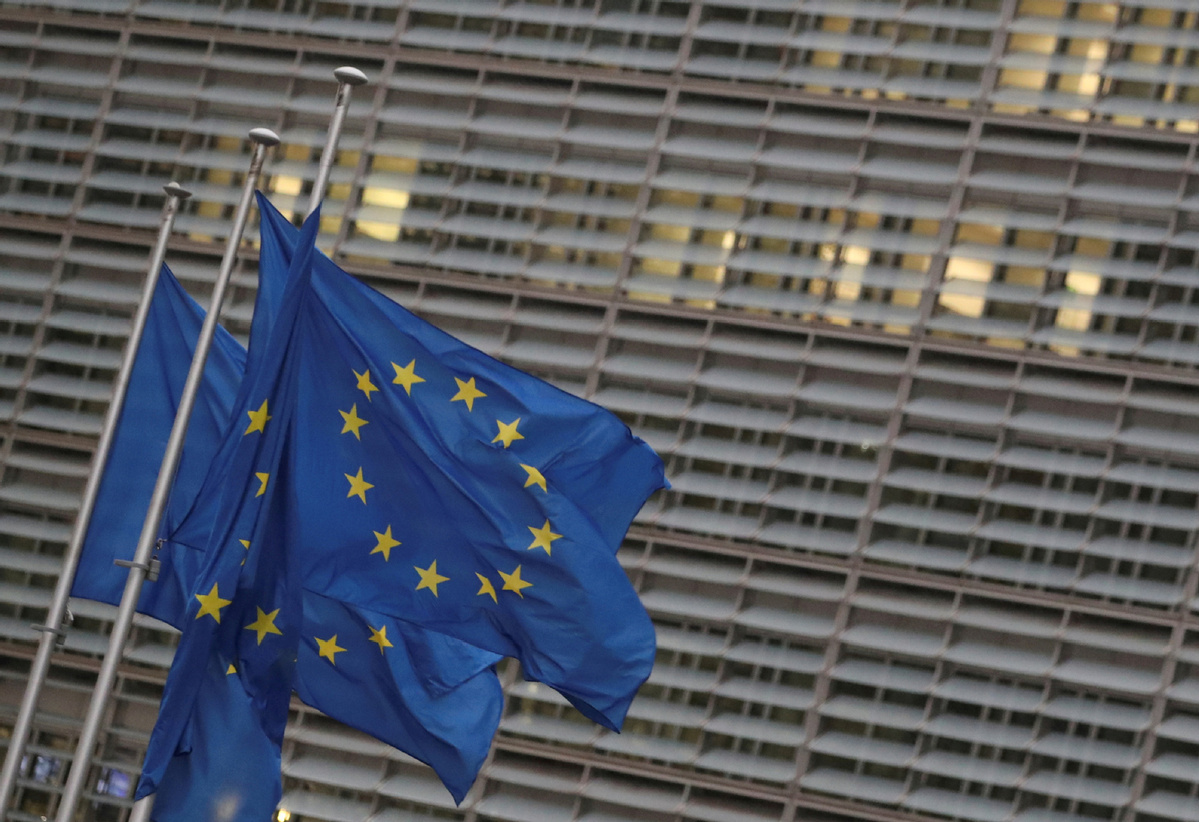
European Union flags flutter outside the European Commission headquarters, where Brexit talks are taking place, in Brussels, Belgium, December 24, 2020. (Photo: Agencies)
Most small United Kingdom manufacturing companies have paid more for raw materials and components since the nation completed its exit from the European Union on Jan 1 than they did before.
According to a survey of 300 businesses by consultants South West Manufacturing Advisory Service and by the Manufacturing Growth Programme, two-thirds of companies are now paying more for source materials.
The troubling news follows recent reports about an exodus of financial companies from the city of London, and a relocation of manufacturing enterprises to the EU because of additional customs checks at borders and resulting costs and delays.
The Reuters news agency quoted Nick Golding, the managing director of the South West Manufacturing Advisory Service, as saying: "Price hikes in the supply chain have been immediate, and we are hearing tales of lead times being extended on raw materials."
He said 65 percent of manufacturers reported higher costs.
And some 54 percent had more trouble exporting goods to the EU after the Dec 31 end of a transitional period that had been in place since the UK formally left the bloc on Jan 31, 2020. That transitional period ensured the relationship continued to function as if the UK was a member of the bloc.
London has described difficulties encountered since Jan 1 as "teething troubles" and set aside 20 million pounds ($27.7 million) for small companies struggling with the transition.
The UK's electorate decided in a 2016 referendum that the nation should leave the bloc, after prominent political supporters said London would be able to forge new trade deals with other nations. But the Bank of England cautioned against the move ahead of the 2016 vote and said recently that Brexit-related trade disruption will reduce UK economic output by 1 percent in the first part of 2021, which equates to a loss of around 5 billion pounds. The central bank also said trade will plummet by around 10 percent in the long-term.
In addition to the high economic cost of Brexit, the UK's exit from the bloc has created difficulties on the island of Ireland, where the Republic of Ireland in the south remains a member of the bloc while Northern Ireland, as part of the UK, has now left.
The situation there has been complicated by the fact that all sides want to avoid the establishment of a hard border, over fears it could reignite sectarian violence.
The Financial Times reported on Monday that London and Brussels have now decided to set up a top-level emergency hotline in response to the issue.
The paper, quoting Maros Sefcovic, the bloc's spokesperson on relations with the UK, said both sides want to de-escalate recent tension.
Sefcovic said they favor a line of instant communication, so they can deal with issues "at the moment they arise, before they become big, big issues".
"What is very important in such a difficult situation is to have trust in your partner and to work together to resolve the issues," said Sefcovic, who is a European Commission vice-president. "Until the dust settles down and the new (post-Brexit) system is introduced, I would say the relationship would really need day-to-day care."
The paper also reported that Brussels is expected to agree that data should be allowed to continue to flow between the UK and the EU.
The bloc made the decision after concluding that the UK guarantees an adequate level of protection of personal information.
The Financial Times said it had seen the draft decision by the European Commission, which, it said, would be great news for companies, especially those in the health, insurance, and technology sectors, that need to transfer personal information to and from the bloc.


